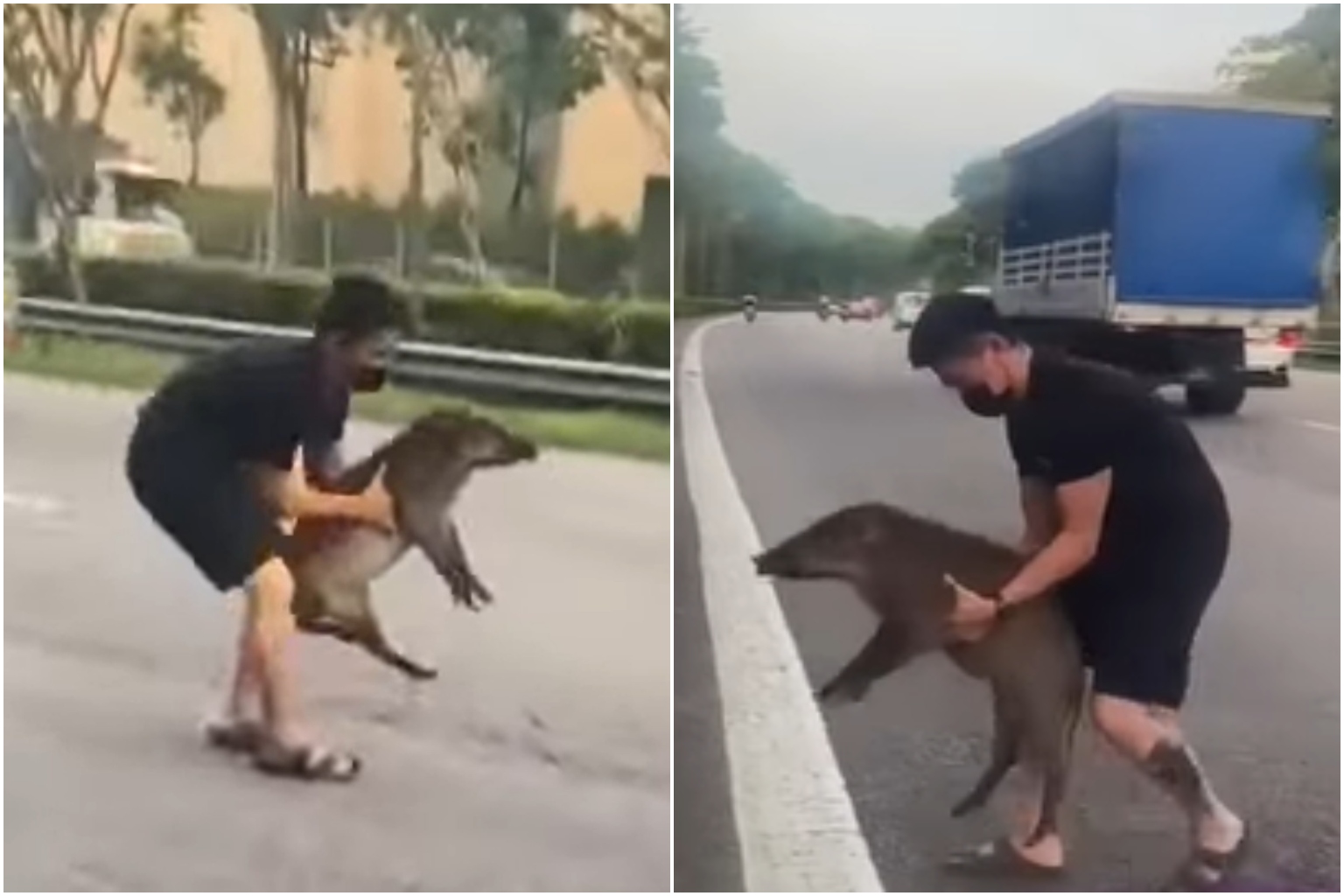Not advisable to move injured boar from KJE, say wildlife experts after online video shows man doing so
Sign up now: Get ST's newsletters delivered to your inbox

On Feb 21, a man was filmed shifting an injured wild boar hogging an expressway, sparking praise from netizens.
PHOTOS: SCREENGRAB FROM SG ROAD VIGILANTE/YOUTUBE
SINGAPORE - The public should not move injured wild animals surrounded by busy traffic at the expense of their own safety, said an Animal Concerns Research and Education Society (Acres) spokesman.
His comments on Wednesday (Feb 23) came after a good Samaritan was filmed shifting an injured wild boar hogging Kranji Expressway (KJE), sparking praise from netizens.
While well-intentioned, this act of bravery could have hurt the man if the powerful animal had turned on him, the spokesman told The Straits Times.
Responding on Thursday to queries from The Straits Times, Dr Adrian Loo, group director of wildlife management at National Parks Board (NParks), said the statutory board is aware of the incident on KJE after a member of public reported it, but no traces of the injured wild boar have been found at the purported incident site.
This is the only case of a wild boar being on an expressway this year, of which NParks is aware, he added.
“We are attempting to reach out to the motorist to obtain more details,” Dr Loo said.
While “the kind and public-spirited act” of the motorist is appreciated, he reminded the public not to handle wild animals on their own as they may turn aggressive, especially when injured, and to contact NParks to manage the situation.
While “the kind and public-spirited act” of the motorist is appreciated, he reminded the public not to handle wild animals on their own as they may turn aggressive, especially when injured, and to contact NParks to manage the situation.
A 29-second video uploaded on Facebook page SG Road Vigilante on Monday shows the boar sitting in the middle of the road while the man prompts it to move.
He then picks up the boar just as two motorcycles move towards it. But the animal writhes out of his grasp, staggers on its hind legs and collapses onto the expressway.
In a second attempt, the man successfully carries the boar and deposits the struggling creature on a road shoulder.
Some netizens who saw the video said the animal looked injured and needed a veterinarian, or the help of wildlife rescue groups to help it recover.
Though what the man did is "commendable and heartwarming", said the Acres spokesman, his actions are not advisable as the situation could have turned ugly if the powerful animal had reacted differently.
"Wild pigs can turn defensive when they are scared," he noted.
In this case, the boar seemed to be dazed and in shock, which explains why the man could carry it to safety, the spokesman said.
While Acres did not handle the incident, he said mammals like wild boars are prone to shock, and fractures and grazes are common when they get into traffic accidents.
If members of the public encounter injured animals on roads, they should always put their safety first, and they can do other things such as controlling traffic or calling for assistance, he added.
Motorists can also play their part to curb roadkill by being more vigilant, especially when driving in areas where wildlife are known to cross.
Traffic accidents have killed many animals in Singapore and this figure may rise as urbanisation further fragments green spaces, forcing more wildlife to cross roads.
In August last year, a critically endangered Raffles' banded langur was struck by a vehicle in Upper Thomson Road. The rare primate can be found only in Singapore and southern Peninsular Malaysia.
Between January 2020 and December 2021, a critically endangered Sunda pangolin and six other animals were killed in Mandai Lake Road.
To curb a potential rise in roadkill, the Acres spokesman called for further studies to be done to identify hot spots for roadkill and more road-calming measures to be introduced.
"Future developments should also take movement of wildlife into consideration in order to mitigate such cases," he added.
Dr Loo said NParks is looking at installing more barriers and guide fences along the Bukit Timah Expressway (BKE) and in forested patches around Eco-Link@BKE - an ecological bridge for wildlife that spans the highway – to direct animals towards the link.
Since the bridge was completed in 2013, various native animals, including the common palm civet and Sunda slow loris, have used the bridge.
The number of reported pangolin roadkill around the ecolink has decreased from an average of about two per year from 1994 to March 2014 to just one between April 2014 and January 2022, said Dr Loo. NParks has also recorded an average of one roadkill incident involving other wildlife, such as macaques and wild boars, in the area between 2015 and 2022.
The public can call NParks on 1800-476-1600 to ask for an expert to deal with an animal. They can also call the Acres wildlife rescue 24-hour hotline on 9783-7782.


